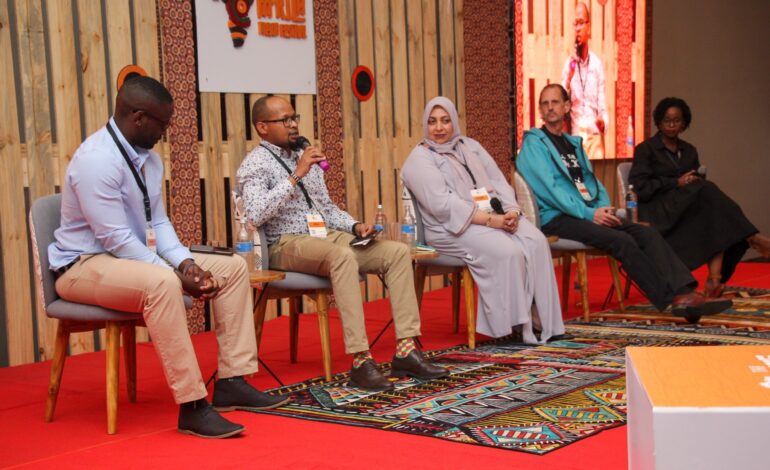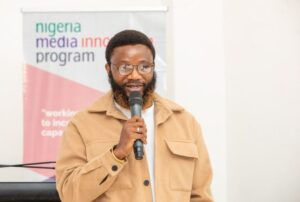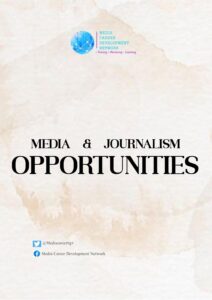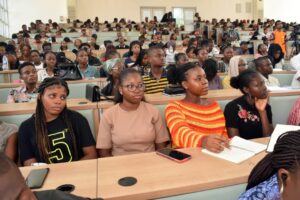What are the options for the media in Africa to address the various existential threats to their survival? This report highlights the major insights and suggestions by speakers at the recent Africa Media Festival in Nairobi, Kenya.
The media like every sector globally is going through lots of disruptions and changes that require journalists and other professionals to be alert to the need for adopting new models and approaches to thrive and remain relevant.
The Africa Media Festival held in Nairobi, Kenya from February 14-15, 2023 hosted by Baraza Media Lab with the very apt theme Re-Imagine media provided a good opportunity to review the state of the media in the continent and provide useful suggestions and ideas for practitioners and media owners to get better at what they do.
At the various sessions on key thematic issues in the industry, top media practitioners and executives in the continent shared their insights and experiences on how to address among others, the problem of job cuts, media houses shutting down, and creators reinventing how they produce, distribute and monetize content.
Although the festival is the first of its kind in the continent, it offered lots of opportunities for mutual learning and the exchange of ideas for media professionals. Indeed, as the organisers stated at the end of the event, meaningful relationships and networks have been formed that will strengthen the media ecosystem in Africa.
Below are some of the key tweets from the festival to think about and take necessary action.
As the Lead Curator of Bazara Media Lab, Christine Mungai rightly stated, there is an urgent need to create our own oasis where new possibilities can emerge despite feeling we are in a political or moral desert.

Local journalism and storytelling
International organizations can’t tell you what’s happening in your own backyard that’s where local journalism is key. –
“Local journalism is key for media freedom. Ad revenue is used to control media, but solutions exist. We must build a resilient ecosystem, try different models, and respond to our audience.”
@khadijapatel; IFPM Khadija Patel, Chairperson, International Press Institute
“It’s time for Africa to tell its own story. We have a unique perspective on the world, and we shouldn’t let others define us. Let’s showcase the best of what our continent has to offer and change perceptions.” ~ @JohnSibiOkumu; Francophone Writer, Actor, Presenter, Moderator
Joyce Kimani – Our journalists at times overthink and complicate things and stories instead of sourcing for the ones happening right in front of our eyes.
“We shouldn’t rely on big overseas publications to tell our stories. We need to be telling our own stories.”
@thecontinent_’s editor @simonallison leading a panel on storytelling.
It’s important for journalists to know they are not only writing stories for their local audience but also writing for regional and international audiences. We need to know each other’s stories. ~ @daddyhope Hopewell Chin’ono, Award-winning International Journalist and Film Maker
“Storytelling can have a powerful impact in a competitive world. Let’s choose positive stories & push campaigns for economic opportunities across Africa. Traditional journalism may not work, so let’s find new ways to communicate.” ~ @dannymucira, Trace TV.
African stories are the real economic power in the media. Yes, we can tell stories that can change the world. CEO at @iamtomiwa Tomiwa Aladekomo, Big Cabal Media

Technology
“AI won’t replace the human touch in storytelling. Instead of running after tech, we need to walk with it. We need to collaborate with tech companies.” – @OliverMathenge; Oliver Mathenge New Media Guru & Trainer | Multimedia Editor@ntvkenya
Machines cannot take our jobs unless what we do is repetitive. It is we humans who train and feed these machines with information, machines are not creative, humans are – Phyian Karinge (@Phyian_karinge)
The end is not here, what is here is transformation & evolution. We are just moving into a new era and new trends and we have to adapt fast. Your job is not at risk unless you can’t embrace change. – Cynthia Kemunto
“Consumers want valuable content & journalists must adapt to thrive. To succeed, we need digital innovation & partnerships, & to localize content for relatability. Prioritize audience connection & invest in a brighter future,”@OliverMathenge
We have to redefine African newsrooms to align with the constant changes in the media ecosystem –@jageyo
Dr Joe Ageyo, Journalist. Communication Practitioner. Media Leader.
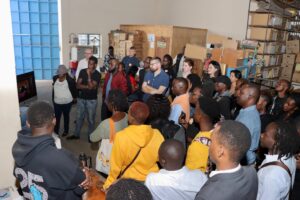
Collaboration
“Collaboration is key in global media. Have the right people in the right place to break down cultural barriers and avoid nuances lost in translation. Let’s work together for better coverage across cultures.” ~ @Samooner; Editor and writer, working for The Conversation Africa @tc_africa
Thabiso Sekhula – I pray for a time when media players will be sharing and collaborating more when telling some of these stories and in the process, reach new audiences and markets.
The media landscape is transforming. My challenge is what happens in the progression of journalism in the next 10 years? And if we don’t start to consider the relationship between the CSOs and media then where are we headed? – Margaret Mliwa @MargaretMliwa
Business model, monetization and funding
When we push campaigns across Africa, we have a huge economic opportunity. Traditional journalism doesn’t make economic sense anymore. We need to find ways to communicate with different communities across the continent. – @dannymucira
We have to think about what a resilient ecosystem looks like. There is no single business model that works. – @khadijapatel
The way we consume media is changing and this means we have to be innovative as far as content production is concerned. Producing good content is not easy. Producing short, effective content is even more difficult. @iGaddo Editorial Cartoonist
@BlessedNjugush on the challenges of monetising content creation, the need to stay true to your brand values and navigating the “he who pays the piper calls the tune…” complexity.
@bilalr – Independent media’s biggest problems are internal. It is important that they self-search, find issues ailing them and address them early enough so that the quality of output is not compromised.
“There are multiple avenues for making money through podcasting such as live shows and selling merchandise. We are going to see advertisers more aggressively pursue working with podcasters.” – Molly Jensen, @mj_akosua
“Marketing is critical in podcasting. You need to think about it like a business. You have to build a community around your work and then eventually you’ll be able to sell to it.” – Dan Aceda, @danaceda, @semabox
“Don’t look at the content as a finished product. Keep looking at it with fresh eyes. The social media space is highly visual and it’s a powerful tool so it’s okay to embrace the trend of podcasts becoming visual.” – Dan Aceda, @danaceda
‘A well-funded newsroom can be objective “#AfricaMediaFestival #ReimagineMedia @africamediafest @BarazaLab
@MariaSTsehai – Essentially, an ideal funding method is being able to comfortably raise money from the consumer to stay afloat. If your subscribers cannot spend money on you, then there’s something you’re not doing right. You’ll have to either change or perish!
@nepurko – As content creators and consumers we need to think in terms of value.

Take-away from Mwihaki:
– We need to collaborate.
– Let’s be aware of the clients and consumers we serve.
– On freedom of expression in Africa: Let’s be creative about the context in which we work. There are other ways of getting our message heard. #AMF2023 @africamediafest
Misinformation
The difference between misinformation and disinformation is intent. Disinformation is deliberate while misinformation is accidental. – Wanjiru Nguhi
Media has to be accountable for any misinformation they contribute to. The media needs to be categorical about their processes. – Doreen Wainainah (@DoreenWainainah) @PesaCheck
“Platforms incentivize behaviour. Let’s promote positive use, verify the accuracy, and prioritize quality over quantity in journalism. Together, let’s encourage responsible content creation and consumption.” ~ Patrick Gathara .@Rahel_O – The media is part of creating and maintaining notions globally. This is how influential this industry is. We always have to be careful so as not to be perpetrators of some of these stereotypes that can be harmful.
Career development and skills
“As young journalists, you need to be unapologetic with the career path you’ve decided to follow. Not everyone wants to help you succeed. In fact, other people will tag along in your journey just to see how hard you fall.” ~ @nadia_abdalla_ @johnallannamu – The most important thing for an explanative journalist is perspective and context. A good journalist has to know the story, the person in the story, where the story is and how it impacts everyone around it.#AfricaMediaFestival #ReimagineMedia https://t.co/W4icQD6p1N
READ ALSO: Unstoppable journalist
